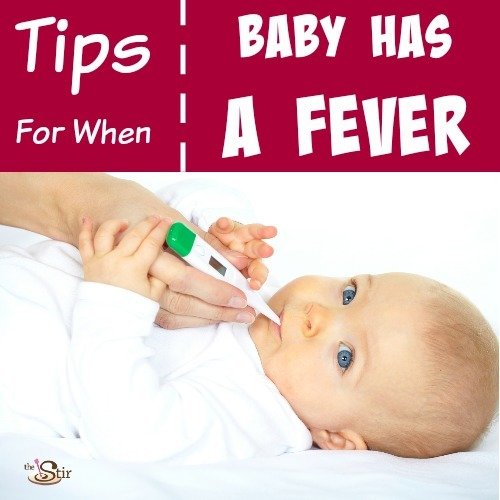Baby fevers can send many moms into a tailspin of worry. You're torn between whether to call their doctor, hightail it to ER, or just take a wait-and-see approach.
The first thing every mom should know when baby's temperature starts to rise: it's not a "fever" until you hit 100.4 Fahrenheit or 38 Celsius. And a fever isn't an illness per se, but a symptom that your baby could be fighting one (like a cold or virus).
What you should do when a fever hits depends on a variety of factors. Consider this your guide to figuring out whether to call the pediatrician or grab your car keys for a trip to the hospital with a feverish baby:

Head to the hospital if …
Your baby is less than 3 months old. "A baby 3 months of age or younger with a temperature of 100.4 degrees or higher should be seen right away by a medical professional, even if that means a trip to the ER in the middle of the night," says Tanya Altmann, MD, associate medical editor of the American Academy of Pediatrics’ Caring for Your Baby and Young Child: Birth to Age 5. The reason: infants this age lack mature immune systems, so sickness can spread quickly and must be contained by medical professionals.
Your baby is 3 months or older with a 104+ fever. For older babies, mild fevers are usually not an emergency since their immune systems are more developed to fight off infections. But fevers higher than 104 are another story, especially if accompanied by other troubling symptoms. "Other symptoms that should make parents rush their baby to the ER include trouble breathing, bluish color of lips or face, vomiting more than two feeds in a row, poor feeding, not waking up to feed, or inconsolable crying," says Dr. Altmann.
Call your doctor if …
Your baby is 3 months or older with a mild fever and other troubling symptoms. "I go less by temperature and more on how the baby looks," warns Bridget Boyd, MD, a pediatrician at Loyola University Health System. So if your child has a fever under 104 and seems particularly sluggish, irritable, isn't eating, or otherwise seems uncomfortable, those are all signs you should call your doctor for advice, not to mention peace of mind.
The fever lasts five or more days. "Once you hit that five-day mark, it could be a more serious issue," says Dr. Boyd. The main illness doctors will want to rule out is Kawasaki disease, an inflammation of the arteries, as well as meningitis or pneumonia. That said, "most likely your child has just caught two difference viruses in a row," says Dr. Boyd. Even so, by five days, it's time to call and probably come in for a checkup.
Wait and see if …
Your baby is 3 months or older with a fever under 104 but is otherwise acting fine. "If your 3-month-or-older baby has a fever but is feeding normally, sleeping well, and otherwise acting well, it’s fine to observe him at home and call your pediatrician if anything changes," says Dr. Altmann. Plus, by this age, it's fine to give your baby medication to ease his discomfort, such as an age- and weight-appropriate amount of acetaminophen. Children older than 6 months can have ibuprofen to treat the higher temperature.
More from CafeMom: 6 Natural Ways to Bring Down Your Child's Fever
That said, "Cold medications should be strictly avoided in children under 6 years old and used with caution in older children," according to Dr. Boyd. The reason: according to the Food & Drug Administration, cold medicines can cause dangerous side effects in kids including rapid heart rate, convulsions, decreased levels of consciousness, and even death.
Bottom line: Until the fever breaks, parents should also keep an eye out for serious symptoms, and when in doubt, call their doctor. But rest assured that in most cases, a fever is not a reason to freak.
What's the highest temperature your baby has spiked?
Images © Eric Audras/Onoky/Corbis; © iStock.com/HannesEichinger




